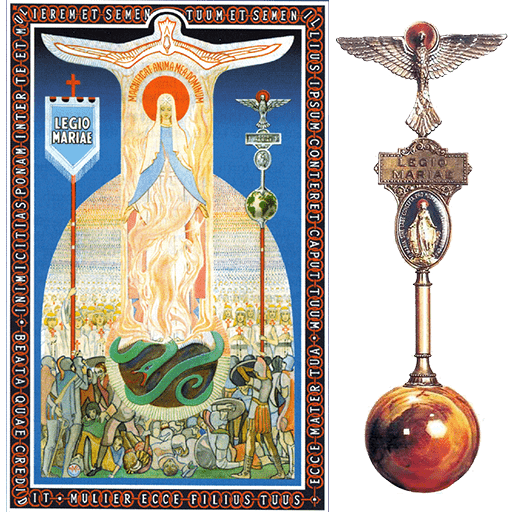November 2018 Allocutio
By Fr. Bede McGregor O.P. Spiritual Director to the Concilium.
The Primacy of Charity in the Legion.
In November the Church celebrates the Feast of all the Saints and this reminds us once more of our own call to be saints and there is absolutely no one who is not called to be a saint. Frank Duff puts it very succinctly: ‘Every person that is born is called to be a saint.’ The feast also reminds us that at the deepest level we are never alone in this life. Pope Benedict expressed this truth movingly in his homily during the Mass for the inauguration of his Petrine Ministry: ‘Surrounded, led and guided by the friends of God, I do not have to carry alone what, in truth, I could not carry alone. All the saints of God are there to protect me, to sustain me and to carry me.’ Each one of us can truly say the same thing. I think that when the inner life of Frank Duff is more fully examined there will have to be a chapter on the extraordinary way he lived out the dogma of the Communion of Saints. It is also an indispensable part of his legacy to the Legion.
Also in November, we commemorate all the faithful departed or as we say: ‘All Souls Day’ or the ‘Souls in Purgatory.’ These members of the Mystical Body of Christ can no longer do anything for themselves but they can do a lot for us and we can do a lot for them. We can hasten their entrance into heaven. It is surely a wonderful apostolate to pray frequently for all the souls in Purgatory and especially our fellow-legionaries who may still need the support of our prayer and intercession. The suffrages prescribed in the Handbook for our departed legionaries express an important tradition of the Legion and we should faithfully carry them out as a sign of the authenticity of our love for our fellow legionaries and perhaps also for the more pragmatic reason that we may need these prayers when our turn comes around.
Now, we are organically united with the saints in heaven and the souls in purgatory because we are all members of the one Body of Christ. Our bonding with them is much deeper than any biological bonding; it is our life together in Christ, in the mystery of the Trinity. What the saints in heaven and the souls in Purgatory have in common is that in varying degrees they all practised what we call the primacy of charity: they tried to love God above everything else and their neighbours to the best of their abilities. And that is the goal of the Legion too. It seeks to live the primacy of charity at all times, in all places, and in all circumstances, in good times and in difficult times. Putting it bluntly, the primacy of charity must be absolute in the heart of every legionary. The Handbook discusses the primacy of charity in the Legion in many places but in chapter 41, the last chapter of the Handbook, it examines it explicitly and at length. The title is: ‘The Greatest of these is Love.’ (1 Cor. 13:13)
Let me quote one paragraph that in some ways is the most important one in the whole Handbook: ‘Within its own ranks there should be an unaffected simplicity and sincere mutual charity among the members, all distinctions being non-existent. If love is due to those whom the legionary serves, it is no less due to its fellow members. The spirit of distinction is evidence of the absence of the first qualification for membership, which is the spirit of love. The whole idea and spirit of the Legion is one of intense charity and sympathy, which before radiating its warmth outside must first of all burn brightly and strongly on the domestic hearth of the Legion itself: ‘By this will everyone know that you are my disciples, if you have love for one another.’ This is just another way of saying that a legionary must first be a Christian. A Christian is someone who loves, not just his friends, or people he gets on with, but the disagreeable and even his enemies. To adapt a saying of St. John of the Cross, in the evening of life or in the last analysis, the Legion will be judged on its efforts to give primacy to charity among its members and to everyone else it contacts.
I would be doing an injustice to the Handbook and its consideration of the primacy of charity in the Legion if I did not stress the Marian motivation behind it. So let me give one quote: ‘Mary was so utterly full of charity that she was found worthy to conceive and bring into the world him who is charity itself. The Legion of Mary, depending for its very life on devotedness to her and imitation of her, must necessarily be distinguished by this self-same quality of intense charity. It must be full of charity; then only will it bring charity into the world.’
